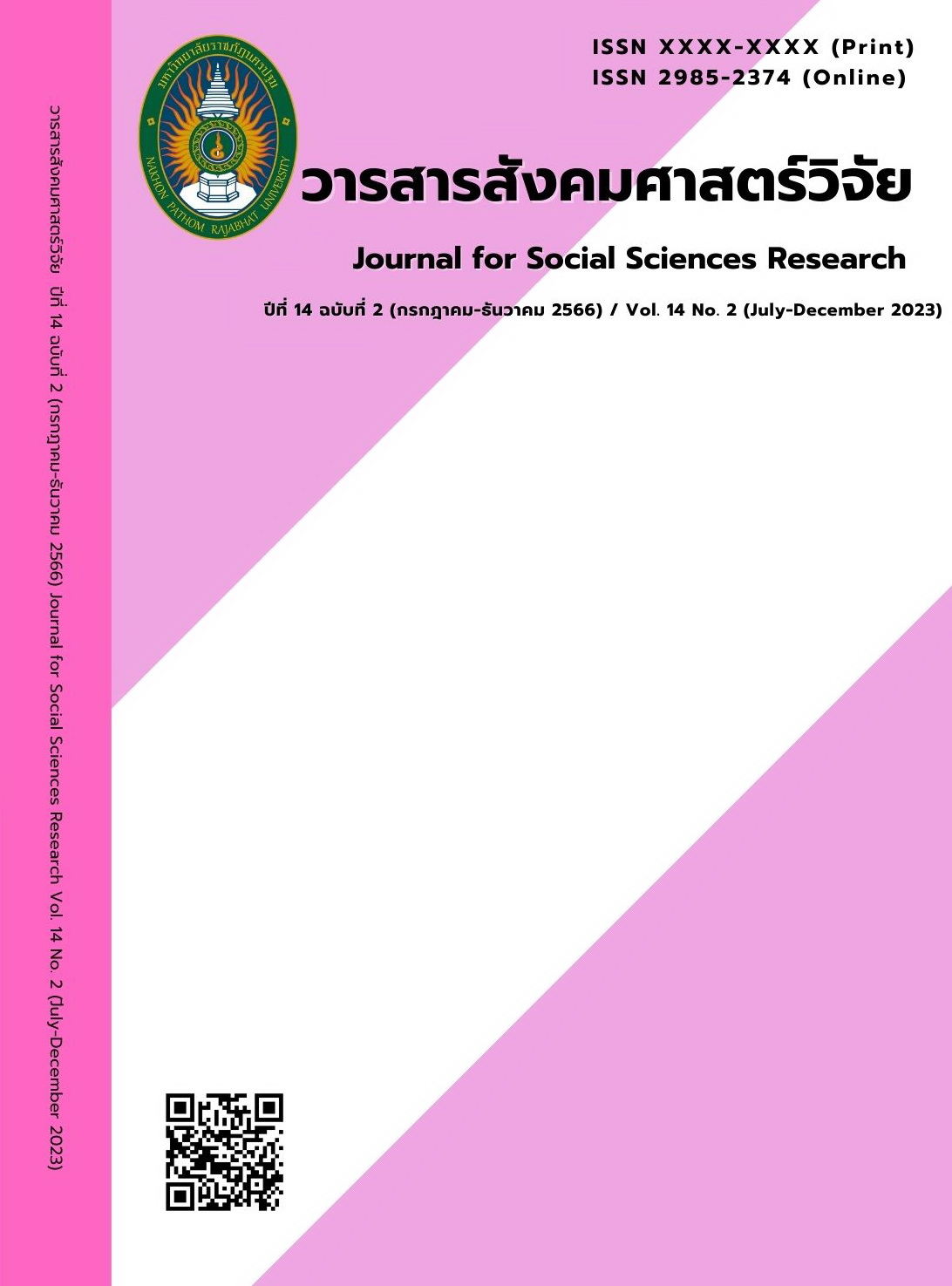LEARNING BEHAVIOR TO USE WOLFRAM ALPHA FOR FACILITATING THE UNDERSTANDING OF MATHEMATICAL CONTENT OF CONSECUTIVE UNDERGRADUATE STUDENTS, COLLEGE OF INDUSTRIAL TECHNOLOGY, KING MONGKUT'S UNIVERSITY OF TECHNOLOGY NORTH BANGKOK
Main Article Content
Abstract
The purpose of this study was to investigate learning behavior to use Wolfram Alpha for facilitating mathematical learning of consecutive undergraduate students of College of Industrial Technology, King Mongkut's University of Technology North Bangkok. The sample group was 46 undergraduate students who had studied 2-3-year consecutive bachelor degree and enrolled in Basic Mathematical Computing by Basic Computation Program Course in the second semester of the academic year 2022. The rating scale questionnaire was employed as a research tool based on Gagne’s learning theory. Descriptive statistics, namely, mean and standard deviation, were used to examine the research findings. The results revealed that overall, learning behavior to use Wolfram Alpha of consecutive undergraduate students in the aspect of learning outcomes or abilities was at a very high level. The factor with the highest effect was attitude with = 4.52 and S.D. = 0.57. The aspect of learning process and memory resulting from information organization in learners’ brain was also at a very good level. The factor with the highest effect was results from external situations affecting internal learning process of learners with
= 4.62 and S.D. = 0.56. Lastly, the aspect of learning behavior to use Wolfram Alpha of consecutive undergraduate students was at a very high level. The factor with the highest effect was online learning behavior with
= 4.48 and S.D. = 0.32.
Article Details

This work is licensed under a Creative Commons Attribution-NonCommercial-NoDerivatives 4.0 International License.
บทความที่ได้รับการตีพิมพ์เป็นลิขสิทธิ์ของมหาวิทยาลัยราชภัฏนครปฐม
เนื้อหาของแต่ละบทความเป็นทัศนะของผู้เขียน ซึ่งที่ปรึกษา บรรณาธิการ กองบรรณาธิการ และคณะกรรมการบริหารวารสารไม่จำเป็นต้องเห็นด้วย หรือร่วมรับผิดชอบใดๆ
References
กระทรวงศึกษาธิการ, สำนักงานคณะกรรมการการอาชีวศึกษา. (2563). หลักสูตรประกาศนียบัตรวิชาชีพชั้นสูง พุทธศักราช 2563. กรุงเทพฯ: สำนักงานคณะกรรมการการอาชีวศึกษา.
ฉัตรปวีณ อำภา และวิสาข์ จัติวัตร์. (2564). การพัฒนารูปแบบการสอนการอ่านเชิงวิชาการโดยใช้แนวทางการเรียนรู้ภาษาเพื่อความรู้ความเข้าใจทางวิชาการในการพัฒนาความสามารถในการอ่านภาษาอังกฤษทางวิชาการ กลวิธีการเรียนรู้และทักษะการแก้ปัญหา. Journal of Roi Kaensarn Academi, 6 (12), 239-254.
ธานินทร์ ศิลป์จารุ. (2557). การวิจัยและวิเคราะห์ข้อมูลทางสถิติด้วย SPSS และ AMOS (พิมพ์ครั้งที่ 15). กรุงเทพฯ: เอส อาร์ พริ้นติ้ง แมสโปรดักส์.
วัชรพงศ์ ศรีแสง. (2555). Wolfram Alpha เพื่อการเรียนการสอนคณิตศาสตร์และวิทยาศาสตร์แบบบูรณาการ. นิตยสาร สสวท., 40 (178), 41-43.
สุธีรา งามเกียรติทรัพย์. (2564). การสร้างบรรยากาศในการเรียนให้เกิดความคิดสร้างสรรค์. นิตยสารเสียงธรรมจากมหายาน, 7 (1), 23-34.
สำนักงานสถิติแห่งชาติ. (2564). อัตราการเรียนต่อระดับมัธยมศึกษาและอุดมศึกษา ปีการศึกษา 2559-2563. ค้นเมื่อ 15 มีนาคม 2566, จาก http://statbbi.nso.go.th/staticreport/page/sector/th/03.aspx
อักษราภัค หลักทอง. (2563). ความสัมพันธ์ระหว่างการเรียนรู้ด้วยใจผ่านเจตคติต่อการเรียนกับลักษณะความใฝ่รู้เพื่อพัฒนาตนเองของเยาวชนในมหาวิทยาลัย. Journal of Liberal Arts, Maejo University, 8 (1), 32-45.
อำนาจ วังจีน และมณีรัตน์ เกตุไสว. (2563). การสอนคณิตศาสตร์และวิทยาศาสตร์พื้นฐานวิศวกรรมในยุคสังคมความปกติใหม่. กรุงเทพฯ: มหาวิทยาลัยศรีปทุม.
Wolfram Alpha LLC. (2010). Wolfram Alpha. Retrieved 15 March 2023, from http://wolframalpha.com/
Wolfram, S. (2003). The mathematica book (5th ed.). Cambridge: Cambridge University Press.


